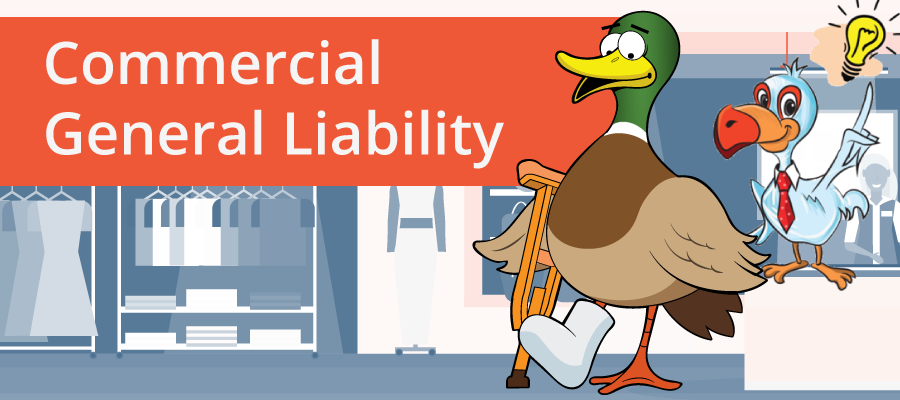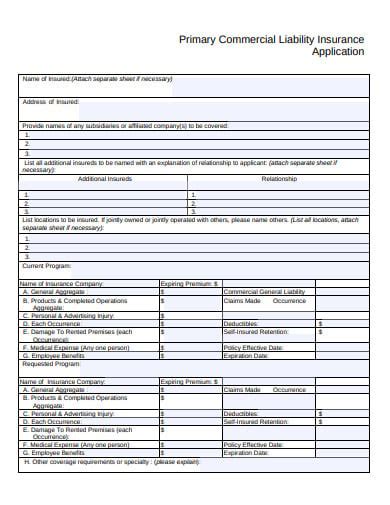Commercial General Liability Insurance Covers

Commercial General Liability (CGL) insurance is a fundamental aspect of risk management for businesses, offering crucial protection against various liabilities that can arise from day-to-day operations. Understanding the coverage provided by a CGL policy is essential for business owners to ensure they have adequate protection tailored to their specific industry and operational risks.
The Scope of Commercial General Liability Insurance

CGL insurance is a comprehensive policy designed to protect businesses from a wide range of liabilities, ensuring financial stability and peace of mind. It provides coverage for bodily injury, property damage, personal and advertising injury, and medical expenses, all of which are essential components of risk management for any business.
Let's delve into the specific areas covered by a Commercial General Liability policy and explore how it safeguards businesses against potential liabilities.
Bodily Injury and Property Damage Liability
One of the primary coverages offered by CGL insurance is protection against claims arising from bodily injury and property damage. This includes situations where a customer or visitor to your business premises sustains an injury or if your business activities result in damage to someone else’s property.
For instance, imagine a scenario where a customer slips and falls on a wet floor in your store, sustaining injuries. A CGL policy would cover the medical expenses and potential legal costs associated with this incident. Similarly, if a product you manufacture causes damage to a customer's property, the policy would provide coverage for the repair or replacement costs.
| Coverage Type | Description |
|---|---|
| Bodily Injury | Medical expenses, pain and suffering, and legal costs arising from physical injuries to others. |
| Property Damage | Costs associated with repairing or replacing damaged property belonging to others, including structural damage to buildings. |

Personal and Advertising Injury Liability
CGL insurance also extends to cover personal and advertising injury, which includes a range of non-physical injuries or damages caused by the business’s products, services, or advertising activities.
This coverage is particularly relevant for businesses engaged in advertising, marketing, or public relations, as it protects against claims of libel, slander, copyright infringement, or invasion of privacy resulting from these activities.
| Personal and Advertising Injury Coverage | Description |
|---|---|
| Libel and Slander | Protection against claims arising from written or spoken statements that damage a person's reputation. |
| Copyright Infringement | Coverage for claims related to unauthorized use of copyrighted material in advertising or marketing materials. |
| Invasion of Privacy | Protection against claims of unauthorized use of a person's name, image, or likeness for commercial purposes. |
Medical Expense Coverage
In addition to bodily injury liability, CGL insurance often includes medical expense coverage. This provision covers the cost of medical treatment for individuals injured on the business premises, regardless of fault.
For instance, if a customer trips over a loose rug in your store and requires medical attention, the CGL policy would cover the costs of their treatment, even if the accident was not directly caused by the business's negligence.
Exclusions and Limitations

While CGL insurance provides comprehensive coverage, it is essential to understand that certain risks and liabilities are typically excluded from coverage.
Common Exclusions
- Professional Services: CGL policies generally do not cover liabilities arising from professional services or advice provided by the business. For instance, if a client sues an accounting firm for incorrect tax advice, the CGL policy would not provide coverage.
- Contractual Liabilities: Claims arising from breaches of contract are often excluded from CGL coverage. This means that if a business fails to fulfill its contractual obligations, the resulting liabilities are not covered by the policy.
- Pollution: Environmental pollution-related liabilities are typically excluded. If a business’s operations result in environmental contamination, the CGL policy would not provide coverage for the associated cleanup and remediation costs.
- Employee Injuries: Injuries sustained by employees on the job are usually covered by workers’ compensation insurance, not CGL policies.
Policy Limitations and Deductibles
CGL policies also come with specific limitations and deductibles that business owners should be aware of.
- Policy Limits: CGL policies have set limits on the amount of coverage provided for each occurrence and in total. Business owners should carefully assess their risk exposure and choose policy limits that provide adequate protection.
- Deductibles: Like most insurance policies, CGL policies have deductibles. This means that the business is responsible for paying a certain amount out of pocket before the insurance coverage kicks in. Understanding and planning for these deductibles is crucial for financial preparedness.
Conclusion: A Comprehensive Risk Management Solution
Commercial General Liability insurance is a vital component of a business’s risk management strategy. By understanding the coverage provided by a CGL policy, business owners can make informed decisions to protect their operations and financial stability.
From bodily injury and property damage to personal and advertising injury, CGL insurance offers a wide range of protections. However, it is equally important to be aware of the exclusions and limitations to ensure that potential gaps in coverage are addressed through additional insurance policies or risk mitigation strategies.
In conclusion, a well-tailored CGL policy, combined with a thorough understanding of its coverage and limitations, empowers businesses to navigate the complexities of liability risks with confidence and peace of mind.
What is the purpose of Commercial General Liability insurance?
+
Commercial General Liability (CGL) insurance is designed to protect businesses from a wide range of liabilities that can arise from their day-to-day operations. It provides financial coverage for bodily injury, property damage, personal and advertising injury, and medical expenses, ensuring that businesses can manage legal and financial risks effectively.
Does CGL insurance cover all types of liabilities?
+
While CGL insurance offers comprehensive coverage, it does have certain exclusions. Liabilities arising from professional services, contractual breaches, pollution, and employee injuries are typically not covered. It’s important to review the policy carefully to understand the specific exclusions and limitations.
How can businesses ensure they have adequate CGL coverage?
+
Businesses should assess their unique risk exposure and consult with insurance professionals to tailor their CGL policy accordingly. This involves considering factors like the nature of their operations, the products or services they offer, and the potential liabilities associated with their industry. Regular policy reviews are also recommended to ensure coverage remains up-to-date with any changes in business operations.



